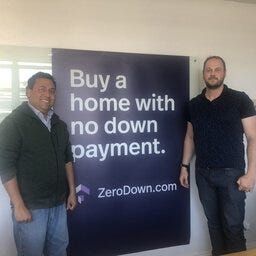
Here's how it works: ZeroDown buys a home with money from a bank that co founder and CEO Abjijeet Dwivedi declined to name. The payments are fixed for real estate that assumes a 5% appreciation. The buyer accrues credits to cash out for down payment assistance in the future, at which point the consumer switches to a more conventional loan. Or they can decide not to buy the home and get some credit back.
"What we say to consumers is you pick a home, we buy it today, then you get five years to close on this home," said Dwivedi.
The company makes its money through a one time $10,000 fee for buyers, and, as described on the ZeroDown website, a venture-capital backed "'white-glove' concierge service and access to other home-related resources" the site says are designed to make life easier for ZeroDown residents.
Greg Smithies and his wife have taken the plunge with ZeroDown, and are now living near Oakland's Lake Merritt in a home they hope to eventually buy.
Smithies, a self-identified "finance guy," thinks the ZeroDown process is a good deal:
"I ripped through all of the numbers on this," he said, likening the use of ZeroDown to having a rich uncle that helped him get off the rental treadmill. "I went to an Ivy League college, my wife went to an Ivy League school, we're graduating with a ton of student debt into a market where, yes, you are earning a lot, but the cost of living is super high."
That high cost of living coupled with stratospheric home prices can make it difficult to save up enough cash for a down payment. That's the niche ZeroDown is hoping to fill.
Smithies' agreement with ZeroDown calls for him and his wife to pay ZeroDown $7,000 per month. "Broad terms, from my point of view, it feels just like I'm paying a mortgage, with a very slight premium on top of that for the fact that they essentially fronted me my down payment," he said.
ZeroDown customers must have decent credit, income and some savings to qualify.
For now, ZeroDown is keeping it small. "We make interesting money only at scale. It's not unusual for a small company to think like that," Dwivedi said.

